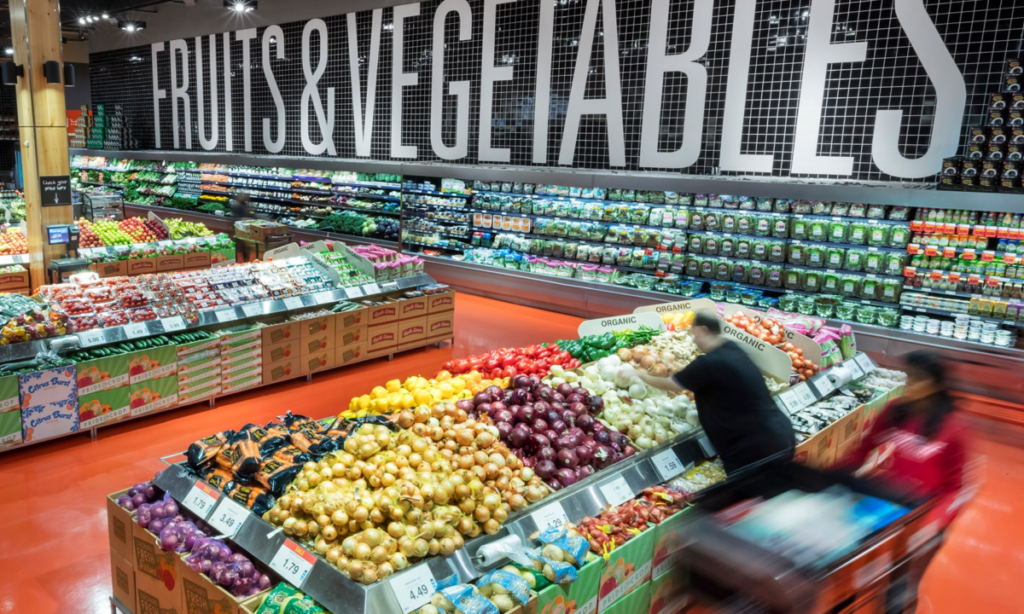The upcoming U.S. election could have significant consequences for Canadian grocery prices, regardless of which candidate wins. Dr. Sylvain Charlebois, Senior Director of the Agri-Foods Analytics Lab at Dalhousie University, suggests that a protectionist shift in U.S. policy could raise costs for Canadian consumers. “We’re facing a more protectionist Western world as a result of this election,” he said. Dr. Charlebois, who is currently working on Canada’s annual Food Price Report, predicts that both parties’ policies may lead to price hikes in Canadian grocery stores.
While either candidate is likely to adopt policies that drive up tariffs, a renewed Donald Trump administration is expected to enforce even stricter trade measures, especially with countries like China. This approach could have a ripple effect on Canadian food prices, particularly for products imported from or closely tied to the U.S. “More tariffs are coming, and these will inevitably push prices higher,” Charlebois emphasized, noting that Canadians could see significant changes at the checkout over the next 12 months.
If Kamala Harris wins the election, Dr. Charlebois expects a shift in tone toward international trade, although protectionist policies are still anticipated. Harris may adopt a less aggressive stance than her opponent, potentially reducing the risk of direct trade confrontations. However, Dr. Charlebois warns that her administration could still prioritize American agricultural interests, which might mean heightened scrutiny on trade agreements impacting dairy, poultry, and other supply-managed sectors in Canada.
Kamala Harris, left, and Donald Trump.
Supply Management Policies and Bill C-282: Could It Backfire?
One unique factor influencing Canadian food prices is the country’s supply management system, which protects certain domestic industries like dairy and poultry from international competition. Dr. Charlebois highlighted Bill C-282, a proposed law that would insulate supply-managed sectors from trade negotiations, raising concerns over Canada’s negotiating power. “Bill C-282 will likely make matters worse for the economy,” he cautioned, arguing that Canada’s strict protections may deter potential trade partners.
For products like milk and poultry, supply management already limits access for international suppliers, which can drive up prices. Dr. Charlebois suggested that should Trump win, the U.S. might demand greater access to Canadian markets, potentially sparking retaliatory tariffs that would impact Canadian consumers. “If Trump wins, we could see targeted trade measures aimed at Canada’s protected sectors,” he warned.
Inflation and Interest Rates Pose Additional Concerns
Beyond supply management, inflation remains a pressing concern. If inflation continues to rise, higher interest rates could follow, further tightening consumer budgets.
“Consumers will likely become even more careful with their food spending as inflation and interest rates rise,” Charlebois noted. He warns that this trend, although gradual, could take a firm hold within the year, making everyday grocery items increasingly costly for Canadians.
Potential Impact of U.S. Dollar Fluctuations and Canada’s Position in North American Trade Dynamics
A potential Trump win may strengthen the U.S. dollar, which would lead to a weaker Canadian dollar and make imported groceries more expensive. Dr. Charlebois noted that Canadian food inflation data already shows rising prices for domestic products, which, when combined with increased import costs, could create a “double whammy” for Canadian consumers. “We’re looking at both domestic and imported prices rising, and it’s not a good situation for Canadians,” he added.
Dr. Charlebois also expressed concerns about Canada’s standing in North American trade if the U.S. continues to put an America-first agenda into action. He anticipates that the U.S. will seek closer ties with Mexico, which could leave Canada in a weaker trade position. “America will continue to put America first, and Canada could be caught in the middle,” he remarked, explaining how Canada’s smaller population makes it less influential on the global stage.
More from Sylvain Charlebois:
Source link : http://www.bing.com/news/apiclick.aspx?ref=FexRss&aid=&tid=6729072254a74a90ab54d8df6fb7d131&url=https%3A%2F%2Fretail-insider.com%2Fretail-insider%2F2024%2F11%2Fhow-a-trump-or-harris-victory-could-raise-grocery-prices-in-canada%2F&c=6933255218103215325&mkt=en-us
Author :
Publish date : 2024-11-04 02:15:00
Copyright for syndicated content belongs to the linked Source.
